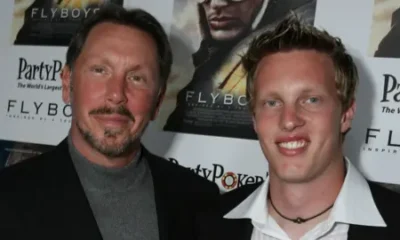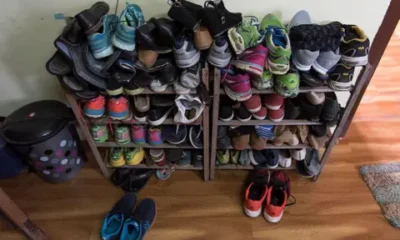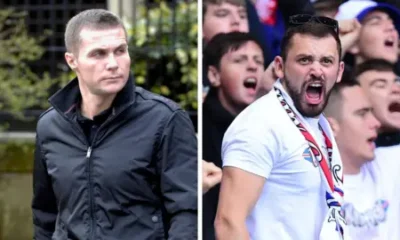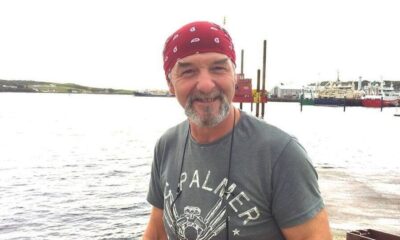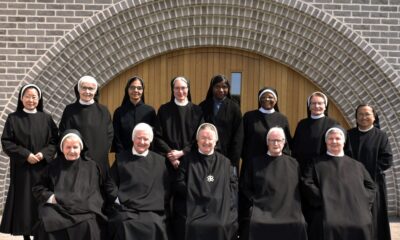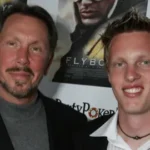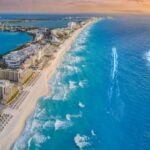Business
Golf: Ryder Cup

Read full article on post.
Business
Move over, Murdochs – a new family dynasty is shaking up US media
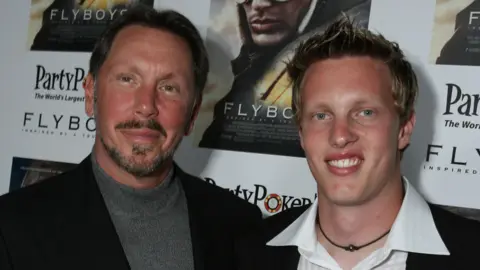
Read full article on post.
Natalie ShermanBusiness reporter
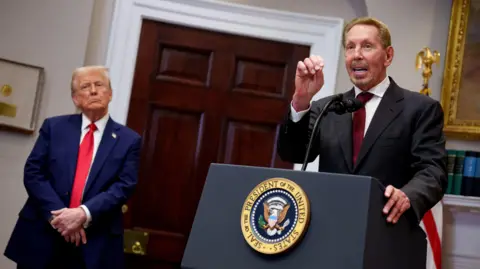 Getty Images
Getty ImagesTech billionaire Larry Ellison and his son, Hollywood producer David, have long walked the halls of the world’s elite.
But this year, their power has taken on a new dimension, as they pursue deals involving names from TikTok to CNN that would give them control over some of the biggest media companies on the planet.
If the Murdoch name is already known the world over, it may not be long before the Ellisons join them.
Paving the way for the family’s ascent is Larry Ellison’s relationship with US President Donald Trump, who has blessed the dealings, praising the elder Ellison earlier this year as “an amazing man and amazing business person”.
“It’s well beyond technology,” he said, describing him as “sort of CEO of everything”.
In some ways, it’s an unlikely path for the Ellisons.
Larry Ellison, 81, made his name mastering the arcane realm of databases and cloud computing, co-founding the software and database company Oracle in 1977.
A giant of the tech world, his fortune, which rests in part on his roughly 40% stake in Oracle, has doubled over the last 12 months, to about $370bn, as the firm takes on a key role building up infrastructure for artificial intelligence.
For a moment this month, he even ranked as the world’s richest person, taking the top spot from Elon Musk.
Ellison’s extracurricular activity to date has tended to skew toward yachting, tennis, anti-aging research and buying an island in Hawaii.
But it’s his relationship with the president that has drawn the most attention recently.
Known as a Republican megadonor, he hosted a fundraiser for Trump in 2020, though he reportedly did not attend the event and federal records show no public contributions to the president.
Oracle became involved with TikTok during Trump’s first term, acting as a host for the app’s user data in the US.
Under a deal brokered by the White House, it is now poised to become an investor with an even greater role, in charge of retraining the algorithm that serves up what we see. (Trump has said the Murdochs, a long established media dynasty, could be involved in the deal as well).
Those ties with the administration have also proved useful for his 42-year-old son, David, as he makes moves to become a major media power player.
His first foray into Hollywood, a 2006 movie about World War I pilots that he financed and co-starred in, was a flop.
But since founding his own studio, Skydance, in 2010, he has earned a name beyond his dad’s billions, producing hits movies such as True Grit, Mission Impossible and World War Z. In 2011, his sister, Megan Ellison, also founded her own production studio Annapurna Pictures, which went on to produce films American Hustle, Her, and Zero Dark Thirty.
Meanwhile, David Ellison pushed Skydance into television, gaming and sports.
But his takeover last month of Paramount, which was backed by his father, marked a significant leap into new territory. Now he’s the boss of a sprawling operation with more than 18,000 employees and new challenges, including overseeing one of America’s biggest news outlets, CBS.
The acquisition required a blessing from the Federal Communications Commission (FCC), which regulates broadcasting in the US and is led by Trump loyalist Brendan Carr.
The Ellisons are also said to be preparing a bid for Warner Brothers Discovery, home to Looney Tunes, Harry Potter and Superman, as well as HBO and CNN, a combination that would create one of the biggest media giants in the US.
That deal would require sign-off from the government, in the form of clearance from competition regulators.
Larry Ellison and David Ellison did not respond to requests for comment, made via their companies.
‘Dangerous for democracy’
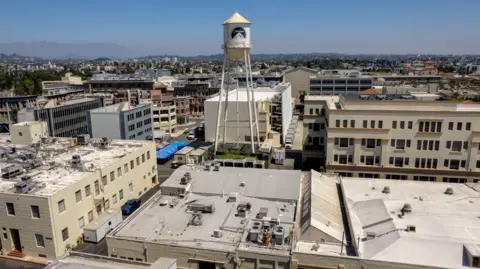 Bloomberg via Getty
Bloomberg via GettyBut against the backdrop of wider White House pressure on the media, the Ellisons’ growing power and ties to Trump have stoked alarm on the left, where critics fear the president’s ability to influence news coverage of his administration.
“The Ellison duo taking over both CBS and CNN, as well as controlling a major social media network like TikTok, would be dangerous for democracy. And given their closeness to the Trump regime, that seems to be the point,” the media watch group FAIR warned recently.
Senator Elizabeth Warren has called for any Paramount-Warner Brother tie-up to be blocked, as a “dangerous concentration of power”. Other groups have criticised the TikTok deal as a giveaway to allies of the president.
House Democrats last month also said they were launching an investigation to see if Paramount-Skydance had made any commitments to Trump to secure approval, a potential violation of anti-bribery laws.
They noted that just weeks before the deal was approved, Paramount agreed to pay $16m to settle a lawsuit with Trump, who had accused CBS of deceptively editing a Kamala Harris interview to help Democrats.
Trump has also said “the new owners” had promised him billions worth of free advertising or programming.
David Ellison has said Skydance was not involved in the Paramount settlement and his firm is in compliance with anti-bribery laws. But he has ducked questions about a side deal, telling reporters last month: “We’re not going to politicise anything today.”
He has also already made some changes at CBS, some of which were conditions announced by the FCC when it signed off on the deal.
Those have included appointing a conservative watchdog to review complaints of bias. The company has also said CBS’s political show, ‘Face the Nation’ will only air live or unedited interviews, a break with long established journalistic practice.
“These actions are in line with what the White House has made clear that they want so I think this is really concerning,” said Rodney Benson, a media professor at New York University and lead author of the book How Media Ownership Matters.
Speaking to reporters after the merger, David Ellison, whose track record of political giving shows contributions to Democrats last year, said he wanted to avoid being associated with either the left or the right.
“We’re an entertainment company first, and I genuinely believe if you’re breathing, you’re our audience,” he said, according to the LA Times. “We want to be in the business of speaking to everybody.”
Other executives pushed back on the notion the firm’s owners would seek to sway news coverage, with Gerry Cardinale, one of Skydance’s partners and the other major investor in the deal with Paramount, calling the idea “bad business”.
“The kernel of the entire investment thesis is independence and objectivity. If you can’t get your head around that, don’t buy it,” he said, according to Variety.
“There’s no way we’re going to try to influence it.”
On Wall Street, Paramount’s potential tie-up with Warner Brothers Discovery has plenty of fans, as investors see an opportunity to create a studio with the distribution power and library to rival Disney and Netflix.
Analysts noted that David Ellison’s background in movie-making and role as chief executive sets him apart from some other tech titans, like Jeff Bezos, who have purchased media publications as a kind of hobby.
But while Ellison has expressed love for the movies – holding onto his mother’s collection of VHS tapes as recently as 2022 – he has said little about the news industry.
Analysts said they would be surprised if it were a priority, given its relatively small financial contribution to the overall business. Ellison has also said he is looking to make $2bn in cuts at Paramount.
“I don’t view this as something that says ‘I want to get bigger into news’,” said Ric Prentiss, managing director at Raymond James. “I think this is something that says ‘I want to create content’… I don’t think news is a strong part of it.”
Paul Hardart, director of the entertainment, media and technology programme at New York University’s Stern School of Business, said the push to grow suggested the Ellisons were looking to seize the moment.
“Who knows how long they will have the administration’s ear?” he said.
After all, when Elon Musk, another mega billionaire and would-be media mogul, tied himself to the Trump administration, that relationship ended up going up in flames.
Business
Have these two scientists found the answer to stop shoes stinking?
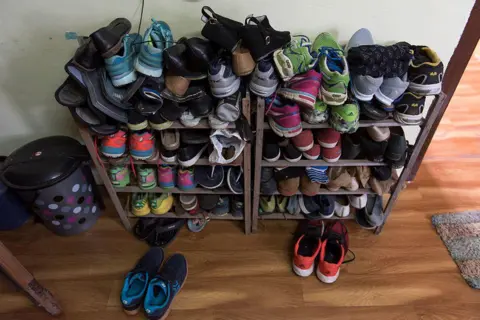
Read full article on post.
Soutik BiswasIndia correspondent
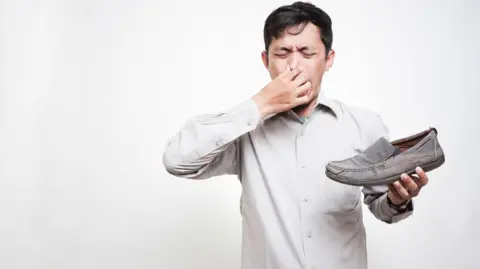 Getty Images
Getty ImagesAlmost every household has at least one pair of shoes whose odour is impossible to ignore.
Multiply that by a family’s worth of footwear, stack them on a rack, and you have a domestic design problem that’s as pungent as it is universal.
Two Indian researchers decided this wasn’t just about stink – it was about science.
They set out to study how foul-smelling shoes shape our experience of using a shoe rack, and in doing so, stepped into the hallowed – and hilarious – halls of the Ig Nobel Prize, a tongue-in-cheek award for silly but inventive scientific endeavour.
Vikash Kumar, 42, assistant professor of design at Shiv Nadar University outside Delhi, taught Sarthak Mittal, 29, during his undergraduate years. It was at the university that the two first hit upon the idea of studying smelly shoes.
Mr Mittal says he often noticed his hostel corridors were lined with shoes, often left outside twin-sharing rooms. The initial idea was simple: why not design a sleek, aesthetic shoe rack for students? But as they dug deeper, the real culprit emerged – it wasn’t clutter but the foul smell that was driving the footwear outdoors.
“It wasn’t about space or a lack of shoe racks – there was plenty of room. The problem was frequent sweating and the constant use of shoes that made them smelly,” says Mr Mittal, who now works for a software company.
So the two embarked on a survey in the university hostels asking a truly human question: if our sneakers reek, doesn’t that ruin the entire experience of using a shoe rack?
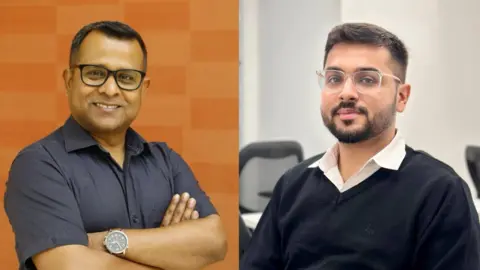
Their survey of 149 university students – 80% of them male – confirmed what most of us already know but rarely admit: more than half had felt embarrassed by their own shoes or someone else’s stink, nearly all kept their footwear in racks at home, and hardly anyone had heard of existing deodorising products. Homegrown hacks – tea bags in shoes, sprinkling baking soda, spraying deodorant – weren’t cutting it.
The two researchers then turned to science. The culprit, they knew from existing research, was Kytococcus sedentarius, a bacterium that thrives in sweaty shoes. Their experiments showed that a short blast of ultraviolet light killed the microbes and banished the stink.
“In India, almost every household has a shoe rack of one type or the other, and having a rack which keeps the shoes smell free would give a great experience,” the authors noted in their paper.
They saw “smelly shoes as an opportunity for re-designing the traditional shoe rack for a better user experience”.
The result? Not your average ergonomics paper – and just the kind of delightfully oddball idea: a prototype for a UVC light-equipped shoe rack that doesn’t just store shoes but sterilises them. (UV covers a spectrum, but only the C band has germicidal properties.)
For the experiment, the researchers used shoes worn by university athletes, which had a pronounced odour. Because bacterial build-up is greatest near the toe, the UVC light was focused there.
The study measured odour levels against exposure time, and found that just 2–3 minutes of UVC treatment was sufficient to kill the bacteria and eliminate the foul smell. It was not simple: too much light meant too much heat which ended up burning the shoe rubber.
The researchers didn’t just point a UVC tube light at the shoes and hope for the best – they measured every whiff.
At the start, the odour was described as “strong, pungent, rotten-cheese-like”. Two minutes in, it had dropped to “extremely low, mild burnt-rubber smell”. By four minutes, the foul stench was gone, replaced by an “average burnt rubber” scent.
Six minutes later, the shoes remained odour-free and comfortably cool. But push it too far – 10 to 15 minutes – and the odour gave way to “strong burnt rubber” while the shoes got hot, proving that even in science, timing is everything.
In the end, the two proposed a shoe-rack fitted with a UVC tube light. Nothing came of it until the US-based Ig Nobel Prize took notice and got in touch.
Organised by the journal Annals of Improbable Research and co-sponsored by Harvard-Radcliffe groups, the 34-year-old Ig Nobel awards 10 prizes annually, aiming to ”make people laugh, then think… celebrate the unusual, honour the imaginative”.
“We had no idea about the prize,” said Mr Kumar. “It was an old 2022 paper – we never sent it anywhere. The Ig Nobel team just found us, called us up, and that in itself makes you laugh and think.”
 Sarthak Mittal
Sarthak Mittal“The award isn’t about certifying research but celebrating it – the fun side of science. Most research is a thankless job done out of passion, and this is also a way of popularising it.”
Keeping the two Indians company this year is a delightfully eclectic cast of winners.
There are Japanese biologists who painted cows to ward off flies, rainbow lizards in Togo with a fondness for four-cheese pizza, US paediatricians who found garlic makes breast milk more appealing to babies, and Dutch researchers who discovered alcohol sharpens foreign-language skills – though it leaves fruit bats bumbling in flight. There’s also a historian who tracked his thumbnail growth for 35 years, and physics researchers exploring the mysteries of pasta sauce.
Winning for stinky shoes, it seems, has only raised the bar for the Indian researchers.
“Beyond recognition, it’s put a burden on us – we now have to do more research on things people don’t usually think about. Ask questions,” says Mr Kumar. In other words, today’s smelly sneakers could be tomorrow’s groundbreaking science.
Follow BBC News India on Instagram, YouTube, X and Facebook.
Business
From drug theft to Dubai arrests: How a Scottish gangland feud went global
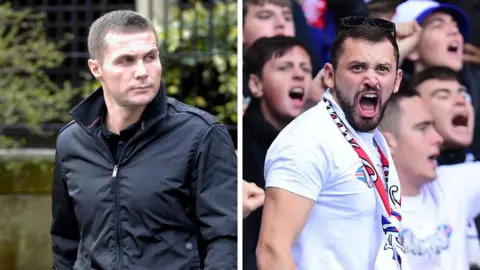
Read full article on post.
Paul O’HareBBC Scotland News
The arrests of four major Scottish crime figures in Dubai remain shrouded in mystery more than 10 days after they were taken into custody.
Steven Lyons, Ross McGill, Stephen Jamieson and Steven Larwood have been held in the United Arab Emirates since 16 September.
Police Scotland believe all four are linked to criminality, ranging from drug importation to a fresh wave of gangland violence across the central belt.
The Gulf raids are the latest development in a bloody feud between the Lyons and the Daniel families which has raged for 25 years.
Both gangs are now on their second generation of leaders.
The Lyons crime group is currently headed by Steven Lyons, one of the Dubai four.
It rose to prominence under the leadership of his father Eddie, of Cumbernauld, North Lanarkshire.
Jamie Daniel – who became a millionaire after starting out as a scrap metal dealer in Glasgow’s Possil – founded and led the crime clan bearing his name.
When he died from cancer in July 2016 there was no obvious successor but the power vacuum he left behind was eventually filled by his nephew, Steven “Bonzo” Daniel.
The bitter rivalry between the two families is said to date back to the theft of a £20,000 stash of cocaine from a Daniel safe house in the north of Glasgow in 2001.
But in December 2006 it became headline news when Michael Lyons, 21, was shot dead after two masked gunmen walked into his uncle’s MoT garage.
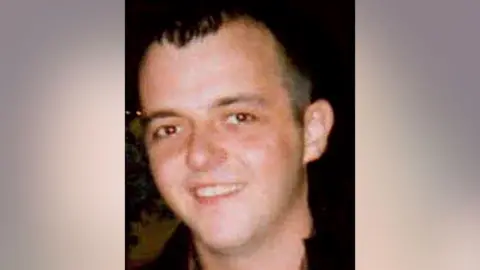 Police Scotland
Police ScotlandSteven Lyons and an associate, Robert Pickett, were injured in the ambush, which was later described in court as “like a scene out of The Godfather”.
In May 2008, Daniel gang members Raymond Anderson and James McDonald were convicted of the attack and each sentenced to 35 years in jail, which was later reduced on appeal.
A series of tit-for-tat attacks followed, ranging from shootings to kidnappings, but it would be January 2010 before the feud claimed a second victim.
Daniel clan enforcer Kevin “Gerbil” Carroll had arranged to meet drug dealer Stephen Glen outside an Asda store in Glasgow’s Robroyston.
Glen later recalled being told: “You’re working for me now, anybody that doesn’t fall in line is going to get banged.”
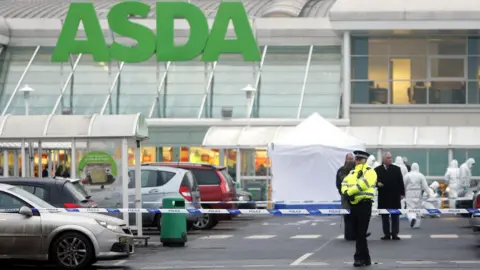 PA Media
PA MediaMinutes later Carroll, 29, was sitting in the back seat of an Audi A3 in the car park when a Volkswagen Golf screeched to a halt.
As lunchtime shoppers looked on, two gunmen got out and shot Carroll 13 times.
I was the Daily Record’s crime reporter at the time and was sent to a retail park frozen in time. As darkness fell, the first vehicles were eventually allowed to leave the massive police cordon.
But, understandably, no-one stopped to speak about the most public gangland hit ever carried out in Scotland.
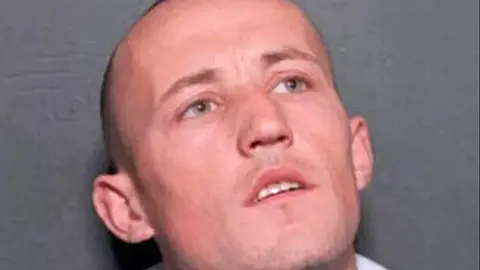 Police Scotland
Police ScotlandCarroll’s significance was later highlighted in court when it emerged detectives investigating the shooting had compiled a list of 99 potential suspects.
In May 2015, William “Buff” Paterson, who fled to Spain after the killing, was convicted of murder and told he must serve a minimum of 22 years in jail.
Judge Lord Armstrong told him: “It was not a spontaneous event which happened on the spur of the moment, it was in effect an execution.”
Jamie Daniel’s death, at the age of 58, was the catalyst for the third significant chapter in the story.
It sparked a savage campaign of violence against his associates.
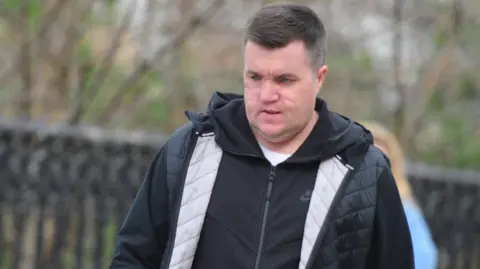 Spindrift
SpindriftThe victims included his successor, Steven “Bonzo” Daniel, who was left with horrific facial injuries after a high-speed car chase through Glasgow in May 2017.
A court later heard a graphic account of how he was attacked with bladed weapons after he crashed his Skoda Octavia – which had been fitted with a tracking device – and passed out behind the wheel.
Two years later, six associates of the Lyons family were jailed after being found guilty of five murder plots.
Lord Mulholland told them: “You sought to turn Glasgow into a war zone for your feud.”
The Dubai arrests also have a link to the case of Jamie “Iceman” Stevenson, who was jailed last year for masterminding a £100m plot to smuggle cocaine from South America in boxes of bananas.
During his trial, he lodged a special defence of incrimination against three men including Stephen Jamieson, one of the four major gangland figures now believed to be in custody in the UAE.
The High Court in Glasgow heard that Jamieson’s present whereabouts were “unknown”.
Last December, the Lyons/Daniel feud was introduced to a wider UK audience as the focus of a six-part BBC Gangster podcast.
At that time, much of the content was historical – but by the summer the producers had reason to commission a new episode.
Until recently, Ross McGill was best known to police as the former head of Rangers Football Club’s ultras fan group, the Union Bears. But after a gangland feud erupted in Edinburgh in March, his name began to appear in the tabloids.
Reports suggested McGill, who once co-ordinated chants on the Ibrox terraces, was now orchestrating the wave of violence across the central belt from his new home in Dubai.
The trigger was a falling out between McGill and Edinburgh-based Mark Richardson – who has connections to the Daniel crime group – over a drug deal said to involve fake bank notes.
McGill’s relative anonymity contrasted with Richardson, who was jailed in 2018 for his role in what detectives described as Scotland’s most sophisticated crime gang.
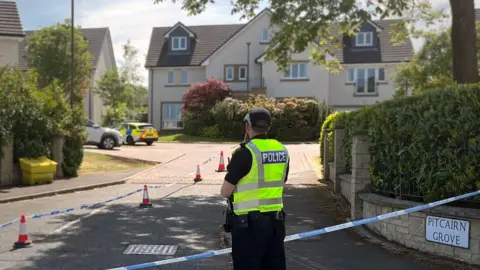
In April, the attacks spread from the capital to Glasgow and the violence escalated from deliberate fires to terrifying assaults.
A profile of the victims also began to emerge.
They included individuals linked to the Daniel family, which naturally led detectives to suspect the Lyons clan had a significant hand in events.
In one incident, a 72-year-old woman and a 12-year-old boy were attacked at a house in Milton in the north of Glasgow.
A 54-year-old man was also seriously injured outside his home in Edinburgh.
As the number of incidents spiralled, videos and threats were posted on social media under the banner of Tamo Junta.
The gang is reportedly led by McGill, who goes by the nickname Miami.
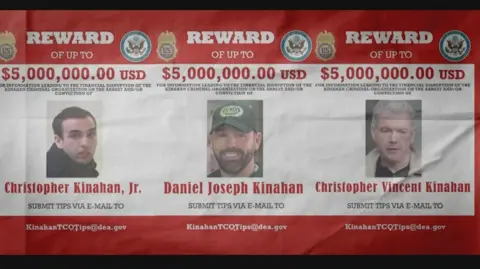 US Treasury
US TreasuryThis tactic is believed by law enforcement sources to have created tensions with Steven Lyons, who had been content to keep a low profile in Dubai.
Lyons had settled there after initially leaving Scotland for Spain, soon after being injured in the 2006 garage shooting.
But in the space of a few weeks the attacks put some of the country’s leading underworld figures and their associates back under the police spotlight.
Steven Lyons’ criminal alliances include ties to the Dubai-based Kinahan crime group.
He is understood to have forged a relationship with founder Christy’s son, former boxing promoter Daniel Kinahan, while living in the Costa del Sol.
Stephen Dempster, producer of Kinahan: The True Story of Ireland’s Mafia, told BBC Scotland’s Scotcast that by the mid-2010s the Lyons group had become bigger and wealthier by tapping into the cartel’s global network.
The BBC journalist also said the UAE was an attractive destination for major criminals.
“There is a level of freedom in Dubai. You can spend your money. There is property to be bought,” he said. “It’s also a place with light touch financial regulation.”
For the most part, Steven Lyons’ business was largely conducted in the shadows – but one night in Spain changed everything.
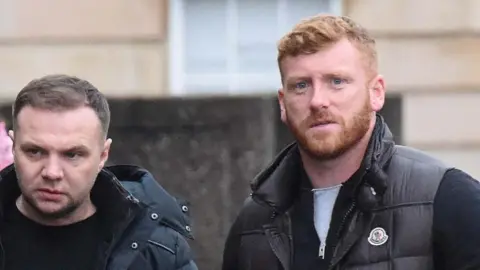 Spindrift
SpindriftOn 31 May, a lone gunman walked into a beachfront bar in Fuengirola and shot his brother, Eddie Lyons Jnr. The suspect then pursued Eddie’s friend, Ross Monaghan, inside and opened fire.
Both men were pronounced dead at the scene.
As the news of their deaths reached Scotland the following morning, there was a genuine sense of shock at the murders.
Eddie Jnr, 46, and Monaghan, 43, were major players in the Lyons crime group. The pair, who were cremated following a double funeral, had both survived previous attempts on their lives.
Eddie was shot and wounded in a 2006 attack which was believed to have been carried out by Kevin “Gerbil” Carroll.
Monaghan stood trial for Carroll’s murder before the case against him collapsed in 2012. Five years later, he was shot outside a Glasgow primary school.
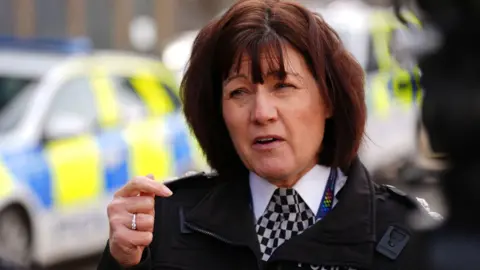 PA Media
PA MediaThere was a natural suspicion that the murders were linked to the violence which had played out in Scotland over the previous two months.
But on 3 June, Police Scotland said there was currently nothing to suggest the shootings were related to the ongoing gang war, which it is investigating under Operation Portaledge.
This chimed with the observations of some law enforcement sources who said the double hit marked a significant escalation from events in Edinburgh and Glasgow.
In an unexpected twist, a Spanish detective later told reporters that a Liverpool man, arrested in connection with the murders, was a member of the rival Daniel gang.
Police Scotland responded by maintaining its original position – that it wasn’t aware of any evidence the shootings were linked to the feud, or had been planned from Scotland.
Later in the month, Chief Constable Jo Farrell said detectives were building intelligence to target the leaders of the groups involved.
Her message to anyone directing violence in Scotland from a foreign country was: “We’ll be coming after you.”
Asked what could be done if someone was based in Dubai, Farrell said officers were working closely with the Crown Office and the National Crime Agency “to see if we can get those people back from those countries”.
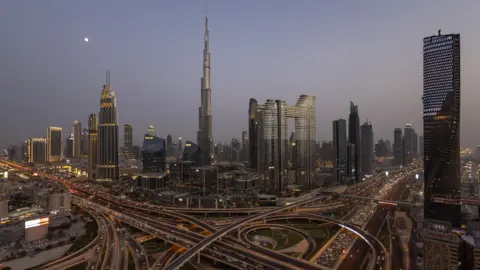 Bloomberg via Getty Images
Bloomberg via Getty ImagesIn the weeks that followed, officers made further arrests under Operation Portaledge – taking the total to 57 – but there was a sense that the momentum was slowing.
And then came the swoop in Dubai, which caught the force by surprise.
BBC Scotland News understands the four men were targeted in connection with alleged offences in the United Arab Emirates (UAE).
But to date there has been no official confirmation from the Gulf about the arrests, let alone why they were made.
A week on, all Dubai Police would say, via email, was: “We cannot share this information due to confidentiality.”
Given the information vacuum, what happens next is unclear.
But the recent extradition to Ireland of gangland murder suspect Sean McGovern raises the prospect that Lyons, McGill, Jamieson and Larwood could return to Scotland.
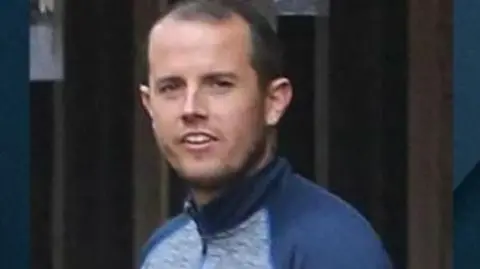 Interpol
InterpolRadha Stirling, founder of Detained in Dubai, said the UAE had recently been co-operating with extradition requests and arresting wanted people more frequently than it had in the past.
“While the UK will almost certainly push for extradition, it remains to be seen whether such a request will be granted,” she said.
The London-based human rights lawyer said the UK had historically declined extraditions to the Emirates due to the risk of human rights violations, unfair trials, discrimination and torture.
“It would be disheartening if the removal of alleged fugitives to Britain put ordinary citizens at increased risk of being sent the other way,” she added.
BBC Scotland News tried several avenues to obtain information about the arrests.
We received no response from the Dubai government, the UK embassy in Dubai, or the UAE embassy in London.
A spokesman for the Foreign, Commonwealth & Development Office would only say that it was in contact with the family of one British man in the UAE and the local authorities.
Many unanswered questions remain and what happens next is anyone’s guess.
But the fate of the Dubai four will be watched with interest by Gulf-based organised criminals who, until last week, believed they were untouchable.
-
Politics5 days ago
European Parliament snubs Orbán with vote to shield Italian MEP from Hungarian arrest
-
Culture2 months ago
Fatal, flashy and indecent – the movies of Adrian Lyne revisited
-
Culture3 weeks ago
Life, loss, fame & family – the IFI Documentary Festival in focus
-
Environment1 week ago
Key oceans treaty crosses threshold to come into force
-
Culture5 days ago
Twilight at 20: the many afterlives of Stephenie Meyer’s vampires
-
Health5 days ago
EU renews support for WHO’s Universal Health Coverage Partnership
-
Culture1 week ago
Farewell, Sundance – how Robert Redford changed cinema forever
-
Culture4 weeks ago
What is KPop Demon Hunters, and why is everyone talking about it?


